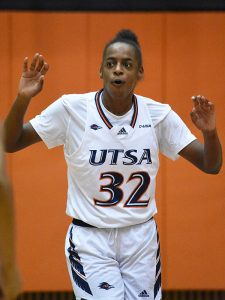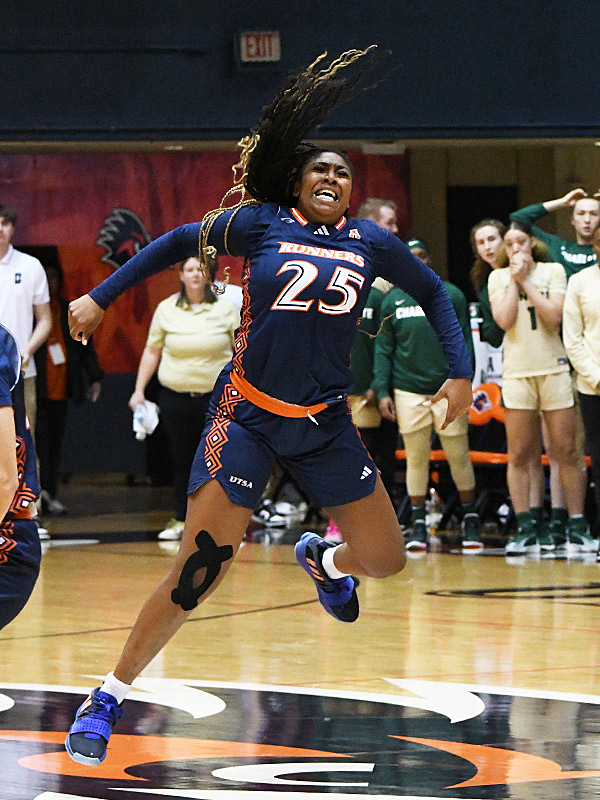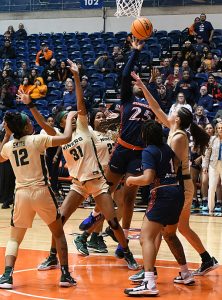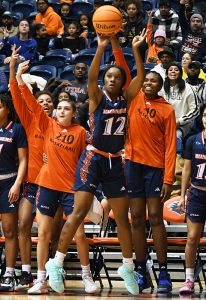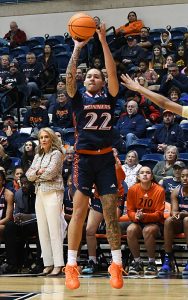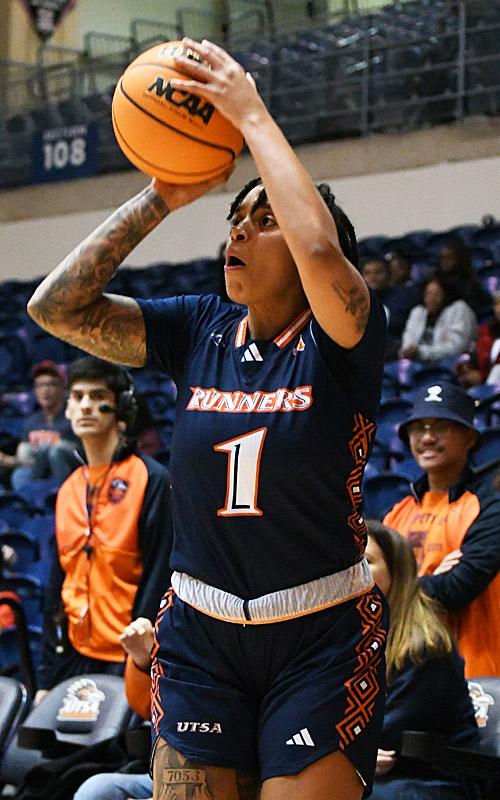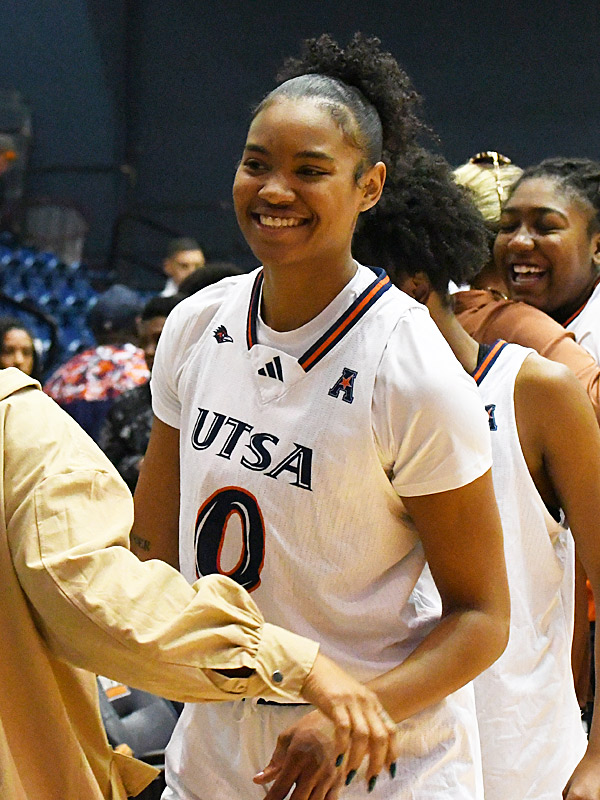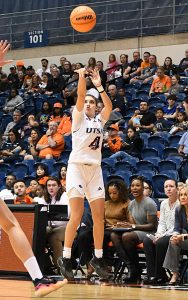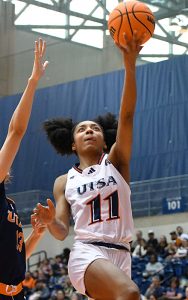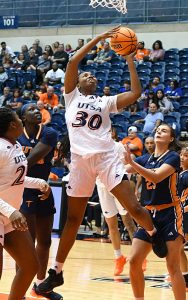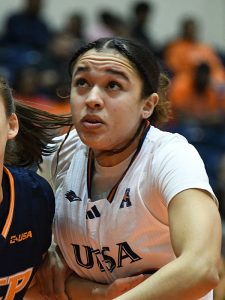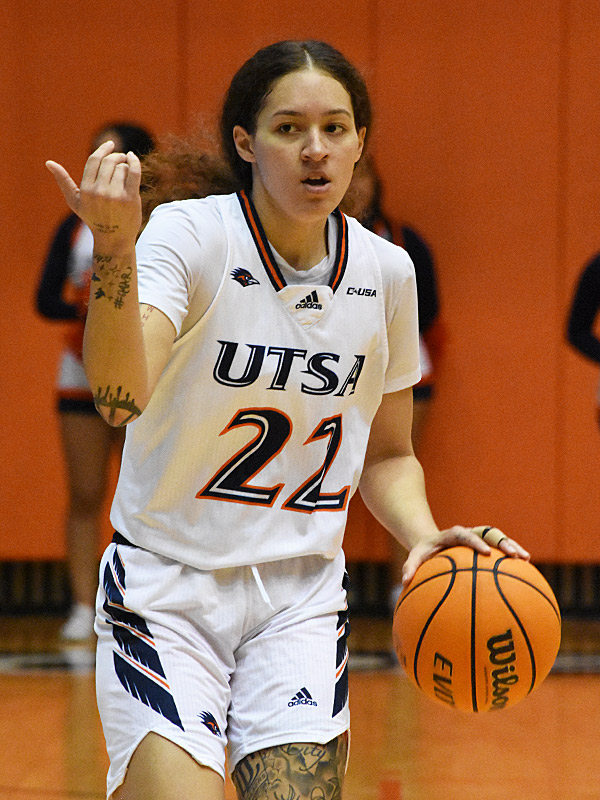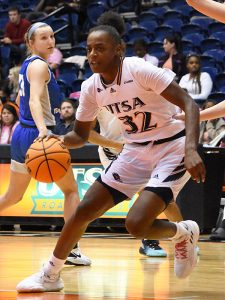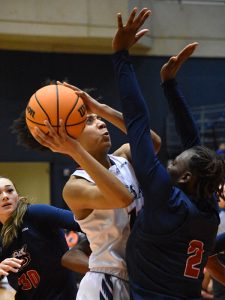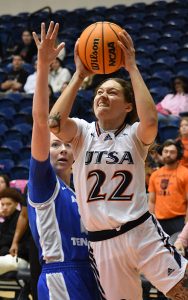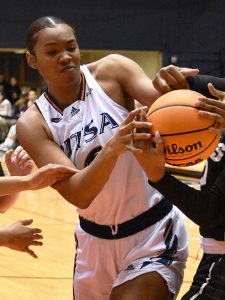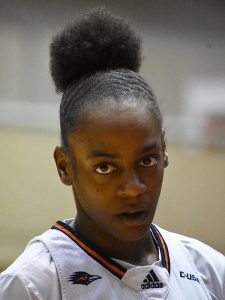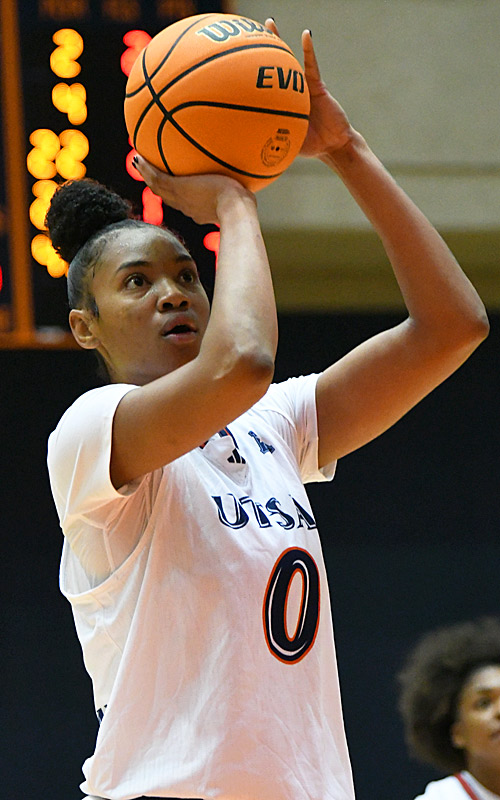
Center Elyssa Coleman, who announced her medical retirement in May, finished a three-year run at UTSA ranked first in school history in blocked shots and ninth in rebounds. She’s on the job now as director of operations for Roadrunners women’s basketball, all while working on her master’s degree in public administration. – Photo by Joe Alexander
By Jerry Briggs
Special for The JB Replay
Players on the UTSA Roadrunners may very well carry a little extra motivation into the coming women’s college basketball season just to make sure that Elyssa Coleman knows they all respect what she did for the program.
At least, that was the heartfelt message delivered on Thursday from sophomore center Idara Udo, who said following an afternoon practice that the Roadrunners hope to play as hard as they can this year for their former center and team leader.
After UTSA’s season ended in the second round of the WNIT last spring, Coleman announced her medical retirement because of chronic knee problems.

UTSA sophomore Idara Udo says she thinks the Roadrunners will play this year to honor Elyssa Coleman’s commitment to team success. – File photo by Joe Alexander
The news that she wouldn’t play a fourth season for the Roadrunners hit Udo hard when it was revealed in a May 24 news post on the UTSA athletics website.
Even though it wasn’t a total surprise to Udo, it was an emotional moment for her, nonetheless.
“It was bittersweet, because I knew that was what was best for her and best for her body, and just best for her in general,” Udo said. “But it was also sad, because, as the season went on, me and Elyssa created a really strong relationship.
“She was kind of like, my mentor, my big sister. So I think it was really hard to come to terms with the fact that I wasn’t going to get to share the court with her another year.”
Udo made her sentiments known a week after Coleman, who now works on the UTSA staff as an operations director, sat down with the The JB Replay and outlined how her ordeal began when she hurt her right knee in February.
At the time, the injury wasn’t deemed as too serious, and she sat out a game on Feb. 12 at home against the UAB Blazers. After that, she returned to the lineup a few days later and played in the team’s last 11 contests, including two in the American Athletic Conference tournament and two more in the WNIT.
It’s no secret that Coleman, a 6-foot-3 post player from Atascocita, wasn’t nearly as productive as the team reached the postseason and played into late March. Still, she battled through it as best she could.
“She is tough,” said Udo, a sophomore from Plano. “I think it just speaks to her character, not only as a teammate, but as a player. It’s just really unselfish, to make that kind of sacrifice for your team.”
Udo said her friend deserves credit for sticking it out through the playoffs even though she wasn’t 100 percent. The Roadrunners hope to reciprocate with a strong effort of their own this season, she added.
“I think that’s a big part of my motivation today,” Udo said. “Just (to) try my best to come out and give it my all … just for her. I think everybody on this team is kind of playing for Elyssa a little bit.”
Last season was the Roadrunners’ best in 15 years. They went 18-15 and advanced to the WNIT’s second round. Coleman bowed out after three years in the program by averaging 10.4 points, 7.2 rebounds and 1.4 blocks per game.
A year of transition
For Coleman, the 2024 calendar year has been eventful, physically painful and, yes, heartbreaking. Also, fulfilling and exciting, because after earning her bachelor’s degree in sociology last December, she started graduate school at UTSA in January.
If all goes to plan, the 22-year-old who ranks first in school history in blocked shots and ninth in rebounding could have her master’s in public administration as early as next summer.

Coach Karen Aston says Elyssa Coleman was ‘looking for a home and some stability’ in 2021 when she transferred from Texas to UTSA. – File photo by Joe Alexander
As a member of Coach Karen Aston’s original UTSA recruiting class in 2021, it was also a thrill for her to experience postseason play in March and a trip to the WNIT with the Roadrunners.
The tough part centered on making a decision when she was confronted with a recommendation from doctors a few weeks after season’s end that she was facing a major surgery and a rigorous rehabilitation if she wanted to continue to play for the Roadrunners.
Ultimately, she elected to have the surgery. But instead of a ramped-up rehabilitation schedule with an eye on a return to the court, she called it a career, a decision that came with a more moderate rehab schedule. Coleman later was announced in July as the team’s operations director.
Reaching the decision to walk away from the game after playing competitively since grade school, she said, wasn’t easy.
“I think that first month was really tough,” Coleman said in an interview last week. “But I think the way everything happened, like, I had a scope (an arthroscopic surgery) at first and then a lot of tests (and) I started to realize gradually what was really going on, internally.
“So it wasn’t all crashing down on me at once. I talked a lot with my dad. Had a lot of prayer. Just talking to God … So, yeah, the first month was hard. But I was paying attention, and my body, it was telling me to stop.”
Coleman’s life now consists of days starting with a 5 a.m. wake-up, a trip to rehab, a trek to work in the office around 8 a.m., a visit to a mid-day practice, a return to the office and then grad school class from 5 to 8 p.m.
Her duties as operations director?
“I basically do all our travel stuff, budgeting,” Coleman said. “I’m being like a team mom … I just keep the girls in the know. If there are any changes, schedule wise, I’m on that.”
Coleman said she is actually busier now than she was at this time in previous years as a player, which is good, because she likes to stay busy. She’s also starting to see college basketball from a different vantage point.
“Being on the opposite side, you start to appreciate things more, just because you see all the work that the coaches are doing behind the scenes, and have been doing since year one, like staying late after practices,” she said. “Like, you think they just wrap up and just go home, too. But it’s constant work.
“I don’t know, the transition hasn’t really been that hard (for me) just because I’ve been having such a close relationship with our staff. So I feel like it’s flowing pretty well, actually.”
Getting into the game
Urged by an aunt to play, Coleman started in basketball competitively at age seven in the Twin Cities Little League in Sour Lake, just outside Beaumont.
She was taller than most of her friends at the time and remembered having fun on what she recalled as a competitive team, which included Ashlon Jackson, who now plays at Duke.
“I’ve always been taller than everybody,” Coleman said. “I remember a story my mom told me. Like, one time I was posting somebody up and I pushed her down (accidentally). I felt so bad. I picked her up and was like, ‘Oh, I’m so sorry.’ ”
At the time, others at the gymnasium were chiming in: “Oh, it’s just a part of basketball.” Added Coleman, smiling and shaking her head, “That’s how sheltered I was. I just wasn’t into sports at all.”
Pretty soon, she figured it out. Once she reached Atascocita, Coleman started to blossom. Overcoming a knee injury that derailed her sophomore season, she gradually improved, and the college coaches came calling.
One of those coaches, Karen Aston from the University of Texas, she really liked. As a result, Coleman committed to Aston and the Longhorns.
“I could just tell she was a people person,” Coleman said. “There’s not a lot of coaches like that, especially in the Power Five. I could tell on my (campus) visit that she was a coach that was always there for (her players). That they could always go to her and talk about whatever was going on.”
Overcoming adversity
Officials at UT elected not to renew Aston’s contract after the 2020 season and hired a new coach, Vic Schaefer.
Coleman reported to the UT program under the new coach but didn’t stay for long. After a blown out knee sidelined her for her one and only year in Austin, she sought a transfer. By that time, Aston had just been hired at UTSA. A few contacts were made, and Coleman, just like that, became a Roadrunner.
Together again at UTSA, Aston and Coleman arrived to rebuild a program that had recorded single-digit victory totals for four straight seasons.
They didn’t turn it around immediately, winning only seven games in 2021-22. By the next season, Aston started to get it going. With Coleman playing at a higher level, Jordyn Jenkins and Kyra White entered the picture, transferring in from Southern Cal, and the Roadrunners won 13. Last season, UTSA won 18 despite a knee injury that kept Jenkins off the floor until well into the spring.
But by the time Jenkins returned, Coleman’s performances had started to plateau with her own knee issue. Regardless, the Roadrunners had their best season since 2009, when they won 24 games and reached the NCAA tournament.
Earning the coach’s praise
In her three years at UTSA, Coleman has added so much to the UTSA program, Aston said.
“I think her willingness to buy into our vision was something that stuck out to me the whole time,” the coach said. “In taking the operations position, I think she’s still on that same path of helping us move the needle for UTSA. I think she’s grown to really care about the program and about the people in it. I think she’s taken a lot of pride in where we started and where we’re at.”
Aston said she will be counting on Coleman to supply some intangibles outside of her office duties.
“It’s a voice,” the coach said. “It’s a voice that understands what I expect. She was a mentor to our young players last year, anyway. I think she can flip the script a little bit and become even more of a mentor because she’s not absorbed with how she’s performing. That’s the biggest piece.
“I love hiring former players. I love moving people up in the system, because they understand your expectations. It’s development. It’s giving back to the game. I think that’s what she’s doing right now. She’s giving back to the game.”
Coleman is also leading the Roadrunners by example. After all, how many Division I athletes help lead a historic program turnaround and then graduate with a bachelor’s degree in three and a half years? How many have a chance to secure a master’s by age 23?
“It’s exceptional,” Udo said. “It’s really inspiring, honestly. It just makes me inspired to keep pushing even on the days when … I’m just overwhelmed with school … and I’m like, ‘This is hard.’ It just gives me motivation to just do it. Because I know somebody who did it, and is still doing it right now.”

